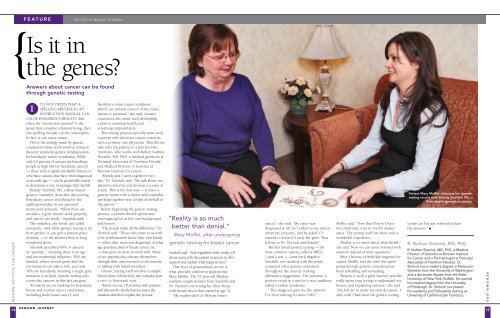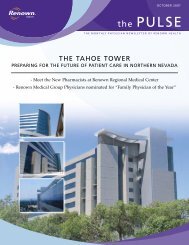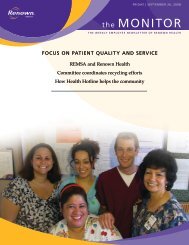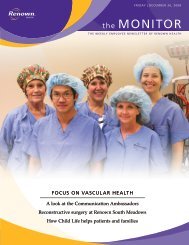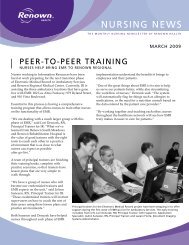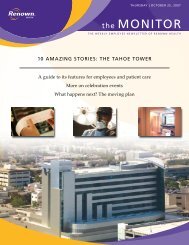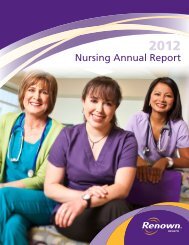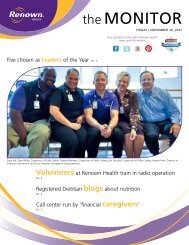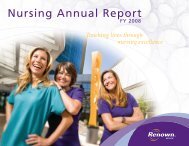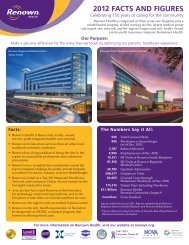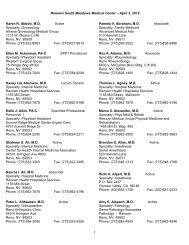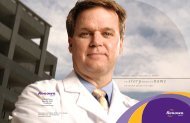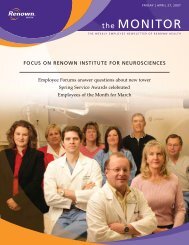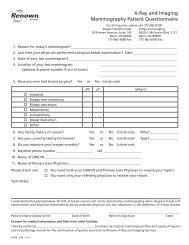Conquering Colon Cancer - Renown Health
Conquering Colon Cancer - Renown Health
Conquering Colon Cancer - Renown Health
Create successful ePaper yourself
Turn your PDF publications into a flip-book with our unique Google optimized e-Paper software.
<strong>Renown</strong> institute foR canceR<br />
14<br />
Feature WRITTEN by MIKALEE byERMAN<br />
Is it in<br />
the genes?<br />
answers about cancer can be found<br />
through genetic testing<br />
I<br />
t’s not often that a<br />
spellIng mIstake In an<br />
InstRuCtIon manual Can<br />
Cause dangeRous Results. But<br />
when the “instruction manual” is the<br />
genes that comprise a human being, then<br />
one spelling mistake can be catastrophic.<br />
In fact, it can cause cancer.<br />
this is the analogy made by genetic<br />
counselors whose work involves trying to<br />
discover a patient’s genetic predisposition<br />
for hereditary cancer syndromes. while<br />
only 10 percent of cancers are hereditary,<br />
people at high risk for hereditary cancers<br />
— those with a significant family history or<br />
who have cancers that have been diagnosed<br />
at an early age — can be genetically tested<br />
to determine a way to manage their health.<br />
Brandy smolnik, ms, a Reno-based<br />
genetic counselor, describes discovering<br />
hereditary cancer as looking for the<br />
spelling mistakes in our personal<br />
instruction manuals. “when there are<br />
mistakes, a gene doesn’t work properly,<br />
and cancer can result,” smolnik said.<br />
the mistakes, she noted, are called<br />
mutations. and while genetic testing is far<br />
from perfect, it can give a patient peace<br />
of mind — or the answers they’ve long<br />
wondered about.<br />
smolnik described 60% of cancers<br />
as “sporadic,” meaning there is an age<br />
and environmental influence; 30% are<br />
familial, where several genes and the<br />
environment can play a role; and only<br />
10% are hereditary, meaning a single gene<br />
mutation is at fault. genetic testing only<br />
covers the cancers in this last category.<br />
“primarily we are looking for hereditary<br />
breast and ovarian cancer syndromes,<br />
including male breast cancer, and<br />
<strong>Renown</strong> joURneY<br />
hereditary colon cancer syndrome<br />
which can include cancers of the colon,<br />
uterus or pancreas,” she said. genetic<br />
counselors also assist with developing<br />
a plan to maintain health and<br />
screenings appropriately.<br />
the testing process typically starts with<br />
a patient who discusses cancer concerns<br />
with a primary care physician. that doctor<br />
may refer the patient to a practice like<br />
smolnik’s, who works with Robert nathan<br />
slotnick, md, phd, a medical geneticist at<br />
perinatal associates of northern nevada<br />
and medical director of genetics at<br />
<strong>Renown</strong> Institute for <strong>Cancer</strong>.<br />
“Brandy and I work together every<br />
day,” dr. slotnick said. “we talk about our<br />
patients’ concerns and develop a course of<br />
action. this is the best way — to have a<br />
genetic forum with a doctor and counselor<br />
working together very closely on behalf of<br />
the patient.”<br />
Before beginning the genetic testing<br />
process, a patient should spend time<br />
investigating his or her own background<br />
and history.<br />
“the details make all the difference,” dr.<br />
slotnick said. “those who come to us with<br />
a lot of information about their own family<br />
— when their mom was diagnosed, at what<br />
age grandma died of breast cancer, etc.<br />
— that gives us more to work with. many<br />
of our patients also educate themselves<br />
through their own research on the Internet<br />
or talking with family members.”<br />
genetic testing itself involves a simple<br />
blood draw followed by the complex part:<br />
a two- to four-week wait.<br />
“Before we test, I’ll sit down with patients<br />
and discuss the family history, assess the<br />
situation and then explain the process,”<br />
“reality is so much<br />
better than denial.”<br />
Mary Moffitt, after undergoing<br />
genetic testing for breast cancer<br />
smolnik said. “and regardless of the results, I’ll<br />
always meet with the patient in person to offer<br />
support and explain what happens next.”<br />
that level of personalized service is<br />
what provides comfort to patients like<br />
mary moffitt. the 57-year-old minden<br />
resident sought answers from smolnik and<br />
dr. slotnick concerning her three bouts<br />
with breast cancer that started at age 32.<br />
“my mother died at 58 from breast<br />
cancer,” she said. “my sister was<br />
diagnosed at 40. so I talked to my doctor<br />
about my concerns, and he asked if I<br />
wanted to know if I carry the gene. that<br />
led me to dr. slotnick and Brandy.”<br />
But her initial genetic testing — the<br />
most common variety, called a BRCa<br />
1 and 2 test — came back negative.<br />
smolnik, not satisfied with the result,<br />
contacted other genetic counselors<br />
throughout the country seeking<br />
alternative suggestions. the outcome: a<br />
positive result in a test for a rare condition<br />
called Cowden syndrome.<br />
“this diagnosis gave me the answers<br />
I’ve been waiting for since 1983,”<br />
moffitt said. “now that I know I have<br />
this syndrome, a lot in my life makes<br />
sense. the testing itself has been such a<br />
wonderful experience.<br />
“Reality is so much better than denial,”<br />
she said. now we can move forward with<br />
answers instead of more questions.”<br />
after a history of multiple surgeries for<br />
cancer, moffitt says the time she spent<br />
going through genetic counseling has<br />
been refreshing and rewarding.<br />
“Brandy is such a great listener, and she<br />
really spent time trying to understand my<br />
history and explaining options,” she said.<br />
“she left me to make my own decisions. I<br />
only wish I had done the genetic testing<br />
Patient mary moffitt discusses her genetic<br />
testing results with brandy smolnik, ms, a<br />
reno-based genetic counselor.<br />
sooner, as I’m just relieved to have<br />
the answers.” ■<br />
r. Nathan slotnick, mD, PhD<br />
R. Nathan Slotnick, MD, PhD, is Medical<br />
Director of Genetics at <strong>Renown</strong> Institute<br />
for <strong>Cancer</strong> and a Perinatologist at Perinatal<br />
Associates of Northern Nevada. Dr.<br />
Slotnick has a master’s degree in Molecular<br />
Genetics from the University of Washington<br />
and a doctorate degree from the State<br />
University of New york, buffalo. He earned<br />
his medical degree from the University<br />
of Pittsburgh. Dr. Slotnick completed<br />
his residency and Fellowship training at<br />
University of California San Francisco.<br />
renown.org 15


